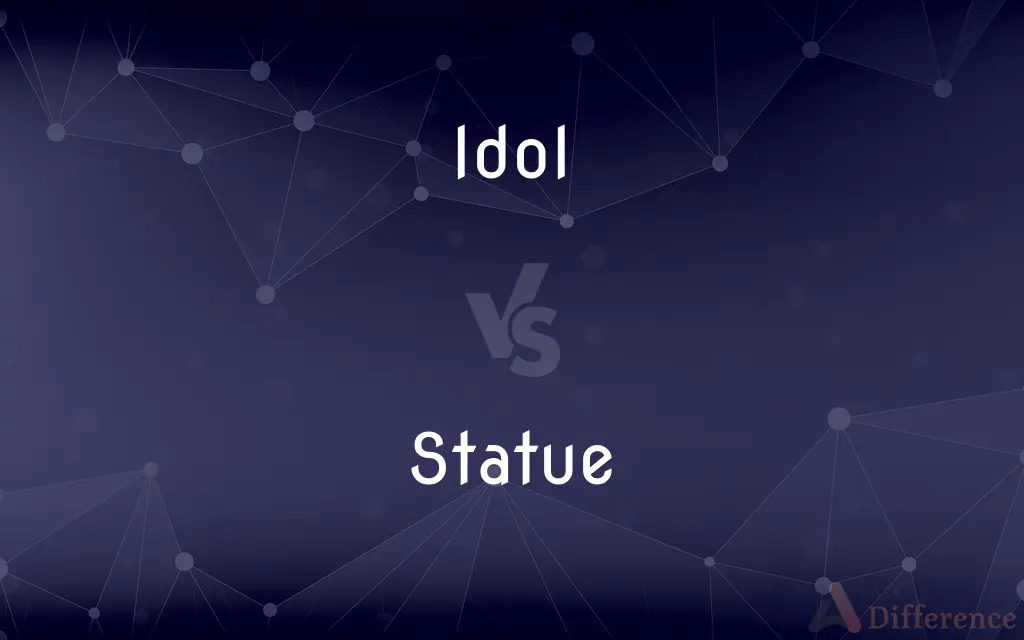Idol vs. Statue — What's the Difference?
Edited by Tayyaba Rehman — By Maham Liaqat — Updated on April 26, 2024
Idols are religious symbols or objects of worship in various cultures, often believed to house spiritual power, while statues are sculptural representations created mainly for aesthetic or commemorative purposes.

Difference Between Idol and Statue
Table of Contents
ADVERTISEMENT
Key Differences
Idols are typically used in religious contexts as objects of worship or veneration, often believed to embody spiritual or divine properties. Whereas, statues are primarily sculptural artworks that represent figures from various contexts, including historical, mythical, or imaginative, without any inherent spiritual significance.
Idols can be found in temples, homes, and places of worship, and are integral to rituals and ceremonies in many religions. On the other hand, statues are commonly found in public spaces, gardens, museums, and as decorative elements, serving to inspire, memorialize, or beautify.
The materials used for idols are often chosen for their religious significance; for example, certain metals or stones may be considered auspicious or powerful. Whereas, statues may be made from a wide range of materials primarily chosen for durability and aesthetic qualities, such as bronze, marble, or wood.
Idols are usually treated with ritualistic care and reverence, often involving ceremonies such as washing, dressing, and offering prayers. On the other hand, statues, while they may be respected for their artistic or historical value, do not typically receive such ritual attention.
The size of idols can vary significantly, but they are often sized appropriately for their role within rituals, sometimes small enough to be handheld. In contrast, statues can range from small tabletop sculptures to massive public monuments, with size generally dictated by artistic or commemorative intent rather than ritual practicality.
ADVERTISEMENT
Comparison Chart
Primary Use
Religious worship and ceremonies
Artistic, commemorative, decorative
Context of Placement
Temples, homes, religious sites
Public spaces, museums, gardens
Material Significance
Materials often have spiritual significance
Materials chosen for durability, beauty
Interaction
Ritualistic care, active worship
Viewed, respected, no ritual interaction
Size Variations
Often small for ritual use
Ranges widely from small to monumental
Compare with Definitions
Idol
A figurine used in religious rituals.
He placed offerings before the idol during the ceremony.
Statue
A carved or cast figure of a person, often life-sized or larger.
Tourists gathered around the famous statue for photos.
Idol
A representation that is profoundly revered or adored.
The movie star was an idol to many fans.
Statue
A decorative element in a garden or park.
The garden's centerpiece is a statue of a classical goddess.
Idol
An object of extreme devotion.
The small idol in the village temple draws pilgrims from across the region.
Statue
A three-dimensional representation of a person or animal.
The statue in the square was erected in honor of the city's founder.
Idol
A religious figure used for worship or spiritual ceremonies.
The idol of the deity was adorned with flowers for the festival.
Statue
An artistic form crafted from materials like stone or metal.
The artist unveiled his latest statue made of recycled metal.
Idol
A symbol embodying a spirit or deity.
In her home, the idol represents both protection and blessing.
Statue
A commemorative object in public spaces.
The new statue commemorates the achievements of unsung heroes.
Idol
An image or representation of a god used as an object of worship.
Statue
A statue is a free-standing sculpture in which the realistic, full-length figures of persons or animals or non-representational forms are carved or cast in a durable material such as wood, metal or stone. Typical statues are life-sized or close to life-size; a sculpture that represents persons or animals in full figure but that is small enough to lift and carry is a statuette or figurine, whilst one more than twice life-size is a colossal statue.Statues have been produced in many cultures from prehistory to the present; the oldest-known statue dating to about 30,000 years ago.
Idol
An image used as an object of worship.
Statue
A carved or cast figure of a person or animal, especially one that is life-size or larger.
Idol
A false god.
Statue
A three-dimensional form or likeness sculpted, modeled, carved, or cast in material such as stone, clay, wood, or bronze.
Idol
One that is adored, often blindly or excessively.
Statue
A three-dimensional work of art, usually representing a person or animal, usually created by sculpting, carving, molding, or casting.
Idol
A graven image or representation of anything that is revered, or believed to convey spiritual power.
Statue
(dated) A portrait.
Idol
A cultural icon, or especially popular person.
Statue
(transitive) To form a statue of; to make into a statue.
Idol
A popular entertainer, usually young, captivating and attractive, and often female, with an image of being close to fans.
Statue
The likeness of a living being sculptured or modeled in some solid substance, as marble, bronze, or wax; an image; as, a statue of Hercules, or of a lion.
I will raise her statue in pure gold.
Idol
(obsolete) An eidolon or phantom; something misleading or elusive.
Statue
A portrait.
Idol
An image or representation of anything.
Do her adore with sacred reverence,As th' idol of her maker's great magnificence.
Statue
To place, as a statue; to form a statue of; to make into a statue.
Idol
An image of a divinity; a representation or symbol of a deity or any other being or thing, made or used as an object of worship; a similitude of a false god.
That they should not worship devils, and idols of gold.
Statue
A sculpture representing a human or animal
Idol
That on which the affections are strongly (often excessively) set; an object of passionate devotion; a person or thing greatly loved or adored.
The soldier's god and people's idol.
Idol
A false notion or conception; a fallacy.
The idols of preconceived opinion.
Idol
A material effigy that is worshipped as a god;
Thou shalt not make unto thee any graven image
Money was his god
Idol
Someone who is adored blindly and excessively
Idol
An ideal instance; a perfect embodiment of a concept
Common Curiosities
What is the main purpose of an idol?
Idols are primarily used for religious worship and ceremonies.
How do people interact with idols?
Idols receive ritualistic care and are often involved in worship practices, such as offerings and prayers.
Who made statues?
An artistic made statues from materials like stone or metal.
What distinguishes a statue from an idol in terms of interaction?
Unlike idols, statues do not typically involve ritual interactions but are admired for their artistic or historical value.
Can statues be considered idols?
Statues can be considered idols if they are used for worship; otherwise, they serve artistic or commemorative purposes.
Where are statues commonly placed?
Statues are typically placed in public spaces, museums, or gardens for aesthetic and commemorative reasons.
Why are idols important in religious practices?
Idols serve as physical manifestations of spiritual beings and are central to various religious rites.
What materials are typically used to make idols?
Materials like wood, stone, or metals, often chosen for their spiritual significance, are commonly used for idols.
Are all statues made from stone or metal?
No,statues are made from various materials including stones and metals.
Can the size of an idol affect its religious significance?
Yes, the size can be symbolic, with some cultures preferring smaller, more intimate idols for personal worship.
Share Your Discovery

Previous Comparison
Esteemable vs. Estimable
Next Comparison
Midriff vs. WaistAuthor Spotlight
Written by
Maham LiaqatEdited by
Tayyaba RehmanTayyaba Rehman is a distinguished writer, currently serving as a primary contributor to askdifference.com. As a researcher in semantics and etymology, Tayyaba's passion for the complexity of languages and their distinctions has found a perfect home on the platform. Tayyaba delves into the intricacies of language, distinguishing between commonly confused words and phrases, thereby providing clarity for readers worldwide.














































